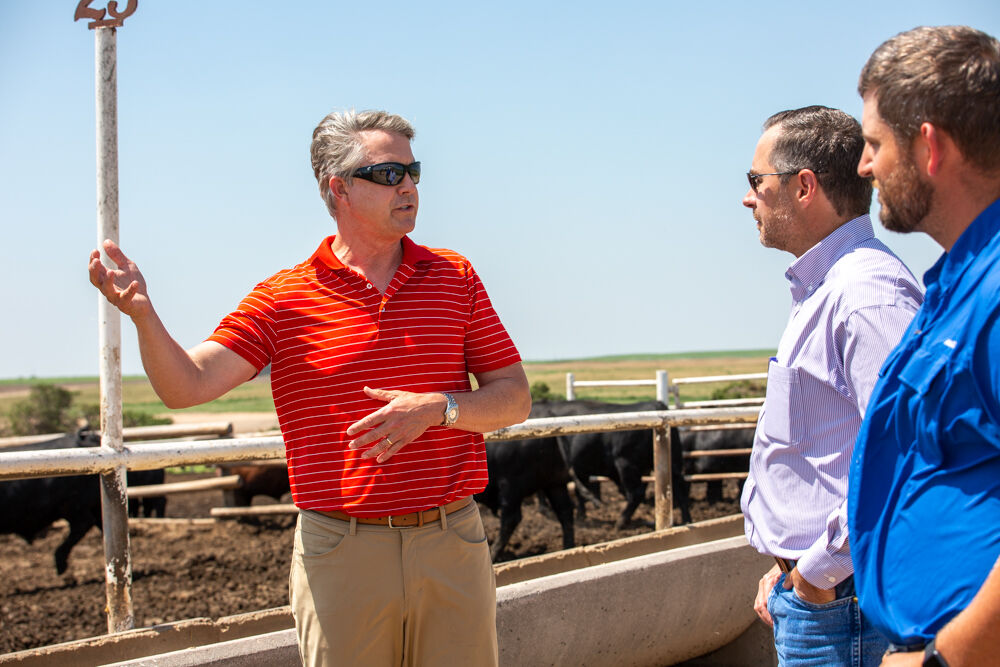Senator Marshall visits Cimarron feedyard, holds roundtable

A hot, windy day in late June gave U.S. Sen. Roger Marshall the full effect of cattle feeding when he stopped by the Gray County Feed Yard near Cimarron, Kansas, to observe the operation. He later held a roundtable at the Irsik & Doll office.
Marshall was in town to hear what the people of southwest Kansas are concerned about, as well as provide information on proposed legislation he’s introduced with nine other senators. The Ending Agricultural Trade Suppression or EATS Act was introduced by Sens. Marshall, Ted Budd, R-NC, John Cornyn, R-TX, Tom Cotton, R-AR, Kevin Cramer, R-ND, Joni Ernst, R-IA, Deb Fischer, R-NE, Chuck Grassley, R-IA, Bill Hagerty, R-TN, and Eric Schmitt, R-MO.
They’re hoping their legislation will prohibit states and local units of government from interfering with the production of agricultural products in other states. Specifically, the EATS Act would prevent states like California from regulating farmers and ranchers nationwide.
“The last thing we need is a big state like California imposing its will on ag-heavy states like Kansas with regulations that will also restrict our ability to trade among the states,” Marshall said. “This is a matter of states’ rights. If California wants to regulate agriculture in its own state, that’s fine, but California’s rules should not apply to Kansas, whose Legislature never approved of these regulations.”
According to a news release from Marshall’s office, the act was introduced in response to the U.S. Supreme Court’s ruling against the National Pork Producers Council in their challenge of California’s Proposition 12. The law mandates a variety of animal production standards and would ban the in-state sale of pork and veal not produced in accordance with California law, even if the hogs and calves were raised in other states.
Marshall said he’s been following this issue for about six months, and they’ve had the legislation in their back pocket. The precedent concerns the Kansas senator since the state is home to about 1.4 million cattle.
Marshall thinks the legislation certainly has a path forward possibly on the farm bill. Clayton Huseman with the Kansas Livestock Association was present at the roundtable, and he too has issues with prop 12.
“That Supreme Court case is extremely concerning,” he said. “And I’m glad to see how quickly we have a legislative solution proposed. And even if it’s not direct impacts, the indirect impacts on the beef industry by a rule like that and how it changes the price of those proteins and therefore could impact the beef market as well.”
Finney County Feed Yard Manager Jeff George believes those who propose legislation like what Prop 12 covers truly don’t understand animal husbandry practices, especially when it comes to swine. Confinement in swine operations helps prevent piglet death.
“To me, it’s absolutely crazy that one state in the union can dictate how the rest of the country operates,” he said. “And I get it, they’re concerned about welfare issues. But people that propose these types of legislation, they truly don’t understand.”
Marshall also talked about the Innovative FEED Act (S.1842), which would modernize the approval process by establishing a new pathway for manufacturers to receive approval for feed additives that improve efficiency in meat and dairy production while also reducing byproducts. The legislation also establishes strict guidelines to ensure only qualifying products are eligible for this pathway while also ensuring products are safe to use.
Marshall recognized agriculture’s contribution to greenhouse gas emissions and pointed out the U.S. dairy herd today is about half the size it was when he was growing up.
“So that alone—we eliminated half the amount of methane gas produced from cattle already,” Marshall said. “And because of genetics and good diet management, nutrition management, good care of the animals, they’re producing more with less.”
Marshall said the additives would be able to get through the approval process in a year, as opposed to five or 10 years like a drug would take in the Food and Drug Administration. Huseman said from an approval standpoint, something like this makes sense.
When asked about his colleagues in the Senate and if Marshall believes they know where their food comes from, he wasn’t very confident in his counterparts understanding of agriculture.
“I think they understand how to milk a cow,” he said. “But they certainly don’t know a steer and a heifer. They don’t understand that you’re growing beef.”
Consumers like the taste of American beef, and Marshall believes there are many out there who are skeptical about production agriculture.
One positive Marshall sees and believes in its importance is how consumers around the globe seek out American grown beef.
"Most everyone can have milk cows, but the one product that no one in the room is replicating is American beef,” he said. “And everywhere I go, Japan, South Korea, China, they love American beef.”
American immigration is one problem Marshall believes needs to be fixed. When it comes back to labor, Marshall believes there has to be a change in mindset.
“If you don’t have a job, let’s help you figure out why,” he said. “And I think our community colleges and technical colleges are the answer.”
Recessions, inflation, drought and other factors have already started to limit growth of companies in southwest Kansas, he said.
Kylene Scott can be reached at 620-227-1804 or [email protected].



